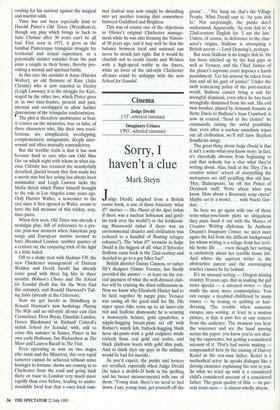Cinema
Judge Dredd ('15', selected cinemas) Imaginary Crimes ('PG', selected cinemas)
Sorry, I haven't a clue
Mark Stcyn
Judge Dredd, adapted from a British comic book, is one of those futuristic 'what if?' movies — like Planet of the Apes (what if there was a nuclear holocaust and goril- las took over the world?) or the forthcom- ing Waterworld (what if there was an environmental disaster and civilisation was reduced to a handful of floating refugee colonies?). The 'what if?' scenario in Judge Dredd is the biggest of all: what if Sylvester Stallone came back in the 22nd century and decided to go to a gay biker bar?
British director Danny Cannon, or rather Sly's designer Gianni Versace, has finally provided the answer — at least on the cru- cial question of what the well-dressed dub- ber will be cruising the third millennium in. Now we know why Elizabeth Hurley had to be held together by nappy pins; Versace was saving all the good stuff for Sly. His super space bike roars up to an inner-city riot and Stallone dismounts: he is wearing a motorcycle helmet, gold epaulettes, a nipple-hugging breast-plate set off with Ratner's watch fob, buttock-hugging black lycra ski-pants with a gold codpiece made entirely from real gold cod scales, and black platform boots with gold shin pads. And to think they say gays in the military would be bad for morale.
As you'd expect, the punks and looters are terrified, especially when Judge Dredd (he takes a double-D both in his spelling and his breast measurements) tells one of them: 'Young man, there's no need to feel down. I say, young man, get yourself off the groun' ' No, hang on, that's the Village People. What Dredd says is: 'Ay yem duh lo.' Not surprisingly, the punks don't understand. Apparently, 'Ay yem duh lo' is 22nd-century English for 'I am the law.'
Unless, of course, in deference to the char- acter's origins, Stallone is attempting a British accent — Lord Denning's, perhaps.
But soon Stallone is no longer duh lo. He has been stitched up by the bad guys as well as Versace, and the Chief Justice of the planet's supreme court imposes a harsh punishment: 'Let his armour be taken from him and all his garb of justice!' Under the swift sentencing policy of the post-nuclear world, Stallone cannot bring a suit for wrongful dismissal, even when he has been wrongfully dismissed from his suit. His evil twin brother, played by Armand Assante as Bette Davis to Stallone's Joan Crawford, is now in control. 'Send in the clones!' he commands, raising the awful possibility that, even after a nuclear cataclysm wipes out all civilisation, we'll still have Stephen Sondheim songs.
The great thing about Judge Dredd is that it isn't a write-what-you-know story: in fact, it's cheerfully obvious from beginning to end that nobody has a clue what they're writing about. Alas, back at the 'Hey, I'm a creative writer' school of storytelling the instructors are still peddling that old line. 'Hey, Shakespeare, lay off this Prince of Denmark stuff. Write about what you know. How about a Brummie soap opera? Maybe set in a motel . . . with Noele Gor- don . . . '
So here we go again with one of those write-what-you-know plots so ubiquitous they must hand it out with the Master of Creative Writing diplomas. In Anthony Drazan's Imaginary Crimes, we meet once again the kid from the difficult background for whom writing is a refuge from her terri- ble home life . . . even though her writing is exclusively about her terrible home life. And where the aspirant writer is, the obstructive parent and the encouraging teacher cannot be far behind.
It's an unusual setting — Oregon mining country 30 years ago. But in making the girl more special — a talented writer — they made the story more commonplace. You can escape a troubled childhood by many routes — by boxing or quilting or hair- dressing. The trouble when someone escapes into writing, at least in a motion picture, is that it puts her at one remove from the audience. The moment you hear the voiceover and see the hand moving across the paper, you know you're not shar- ing the experience, but getting a considered account of it. That's bad movie making — compounded here by the casting of Harvey Keitel as the con-man father. Keitel is a methodical actor: he speaks dialogue like a driving examiner explaining the test to you. So what we wind up with is a considered child's considered account of a considered father. The great quality of film — its pre- sent tense-ness — is almost wholly absent.


















































 Previous page
Previous page